
Stats, Trends, and Strategies Introduction:
In today’s fast-paced business world, convincing your company’s decision-makers to invest in a B2B content marketing strategy can be a challenging task. This approach requires a long-term commitment to delivering value and building customer relationships. However, with a wealth of compelling statistics and evidence, you can make a strong case for content marketing. In this post, we’ll explore the key statistics, trends, and strategies that highlight the importance of content marketing in the B2B landscape.
Does content marketing really work?
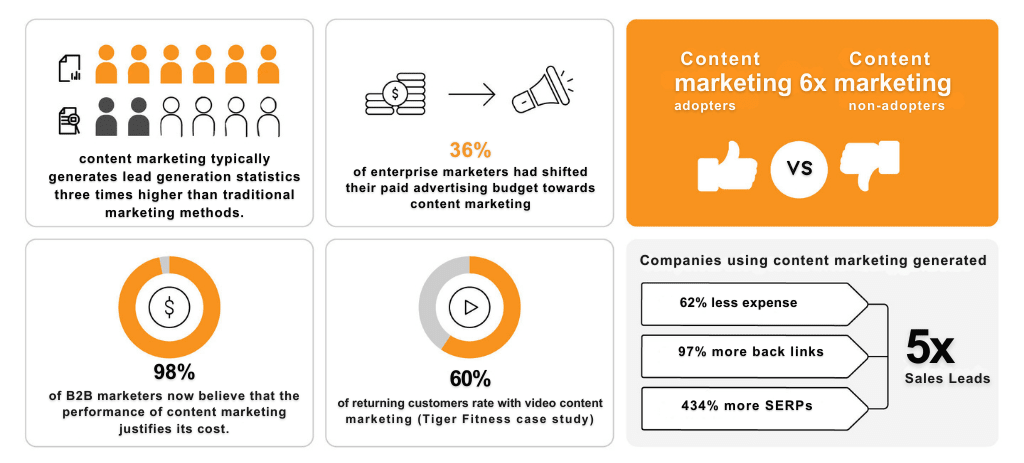
- A 2012 study by Kapost and Eloqua discovered that content marketing typically generates lead generation statistics three times higher than traditional marketing methods. And also, costs 62% less in marketing.
- According to the Aberdeen Group’s 2013 report, websites that adopted content marketing had website conversion rates nearly six times higher than those that did not (2.9% compared to 0.5%).
- Companies utilizing content marketing, as reported by SEMrush in 2019, generated 97% more backlinks and achieved 434% more search engine results pages (SERPs) compared to those that did not. Content marketing also cost 62% less and resulted in five times as many sales leads.
- A survey by the Content Marketing Initiative and Marketing Profs in 2020 revealed that 36% of enterprise marketers had shifted their paid advertising budget towards content marketing in the preceding 12 months.
- A study by Walker Stands in 2019 showed that 98% of B2B marketers now believe that the performance of content marketing justifies its cost.
- In a content marketing ROI study carried out by Tiger Fitness in 2017, they showcased that video content marketing achieved an impressive 60% rate of returning customers.
Why is Content Marketing Important for B2B?
High-quality content is crucial for raising brand awareness, building trust, and forming meaningful relationships with your audience. It also plays a vital role in SEO, given search engines’ emphasis on relevance and quality in search results. The following statistics underscore its significance:

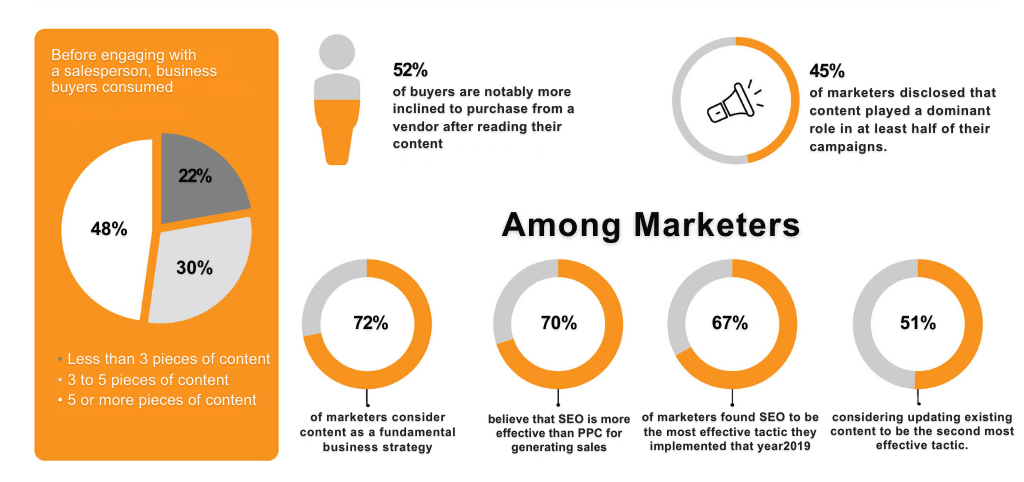
- In 2020, the Content Marketing Institute and Informa Connect found that 72% of marketers consider content as a fundamental business strategy.
- In 2019, the World Media Group reported that 45% of marketers disclosed that content played a dominant role in at least half of their campaigns.
- The Demand Gen Report’s 2020 data shows that 48% of business buyers engage with three to five pieces of content before connecting with a salesperson, while 30% consume five or more pieces before any interaction with a salesperson.
- A 2020 report by Marketing Charts indicates that 52% of buyers are notably more inclined to purchase from a vendor after reading their content.
- As of 2019, Databox reported that 70% of marketers believe that SEO is more effective than PPC for generating sales.
- In 2019, SEMrush’s survey showed that 67% of marketers found SEO to be the most effective tactic they implemented that year, with 51% considering updating existing content to be the second most effective tactic.
Content Marketing vs. social or email marketing:
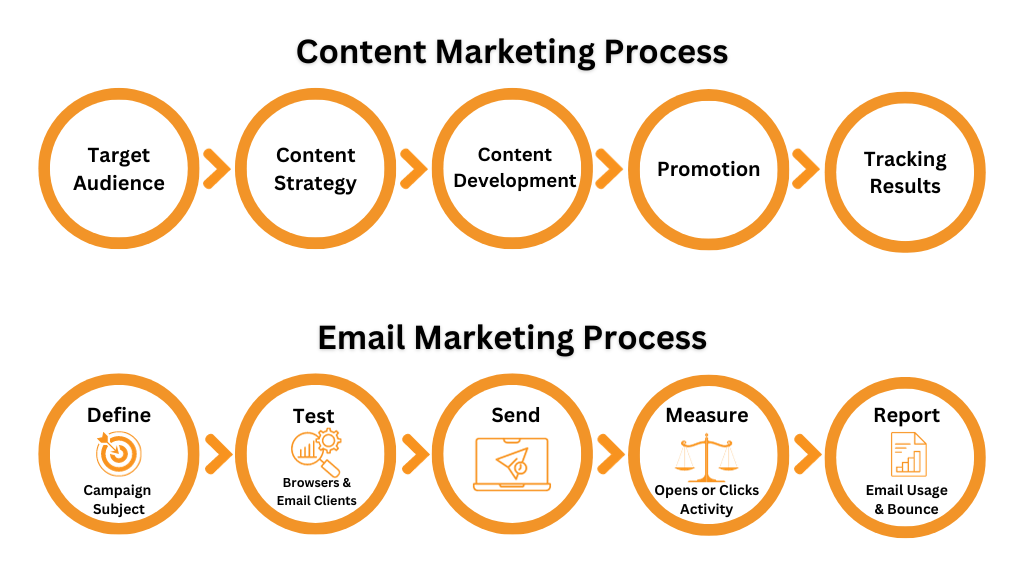
Recent data highlights the changing landscape of social and email marketing, making personalization and relevance more critical.
- Approximately one out of every three adults in the United Kingdom (35.7%) has reduced their usage of social media over the past year. Among them, 29% mentioned feeling overwhelmed as their primary reason for either deleting or temporarily suspending their social media accounts. Meanwhile, 26.7% expressed a lack of trust, often linked to concerns about fake news (Exposure Ninja, 2019).
- According to a study by Hootsuite in 2019, 50% of marketers consider personalizing content and user experiences to be a significant challenge in the realm of social media moving forward.
- According to Adove’s 2019 data, just 57% of personal emails are being opened by recipients, and a mere 37% of them are considered truly valuable.
- In a report by Validity in 2019, 27% of marketers reported an average email open rate of just 11-15% for bulk email sends.
How Does Content Marketing compare to social and email:
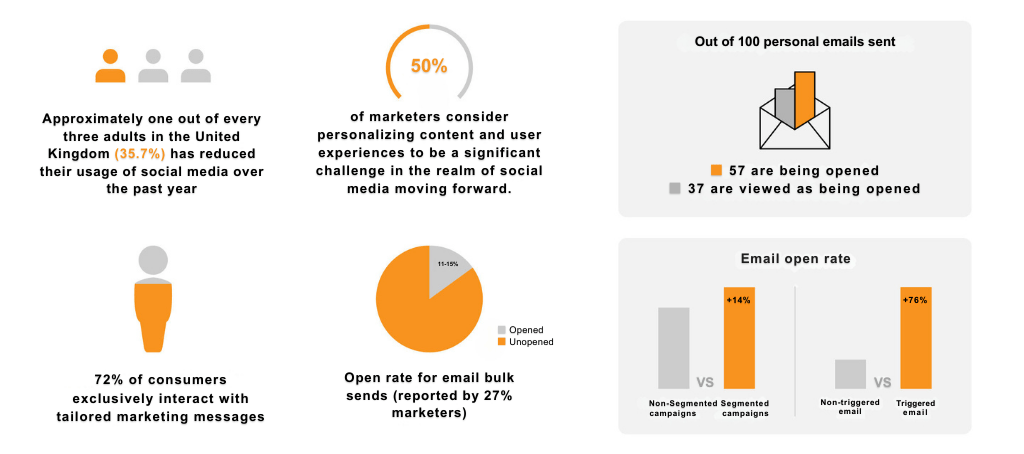
Combining content marketing with marketing automation empowers businesses to craft and distribute precise, pertinent content, addressing the very demands of successful social and email marketing endeavours.
- A striking 72% of consumers exclusively interact with tailored marketing messages (source: Smartlnsights, 2019).
- In the realm of email marketing, triggered emails achieve a remarkable 76% higher open rate on average compared to their non-triggered counterparts (source: Epsilon, 2019).
- Furthermore, employing segmentation in email campaigns results in an impressive 14.32% boost in open rates when compared with non-segmented campaigns (source: Mailchimp, 2017)
How can content marketing help a business?
Content Marketing plays a pivotal role in bolstering brand recognition and engagement by ensuring the consistent presence of valuable content at every stage of the customer journey. In the realm of B2B, statistics demonstrate that buyers not only consume this content but also share it within their professional networks when they perceive it as beneficial. Beyond its ability to enhance brand visibility among potential clients, content marketing fosters stronger bonds with existing customers.

- A striking 86%of B2B marketers leveraged content marketing in the past year to elevate their brand awareness (Content Marketing Institute, 2019)
- An impressive 81% of B2B professionals affirm that they actively disseminate business-related content among their LinkedIn connections, while 70% extend the reach of such content by sharing it with peers and colleagues via email (Demand Gen Report, 2020).
- Notably, 63% of marketers have effectively harnessed content marketing to cultivate loyalty among their existing customer base within the previous year (Content Marketing Institute/Marketing Profs, 2019)
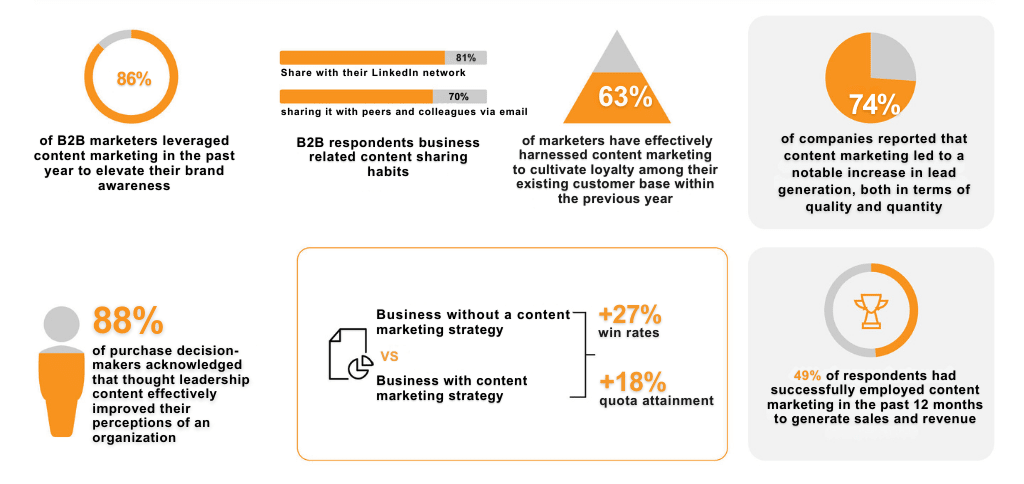
Statistics highlight the profound impact of content marketing on enhancing your overall sales and marketing endeavours. Crafting personalized and relevant content plays a pivotal role in not only improving the quality of leads but also nurturing them effectively. This seamless transition of prospects from marketing to sales ensures consistent message delivery, fostering a cohesive experience while positioning your brand as an industry authority.
- In a study by Curata in 2017. 74% of companies reported that content marketing led to a notable increase in lead generation, both in terms of quality and quantity.
- According to CSO Insights, in 2019, businesses with well-defined content marketing strategies achieved 27.1% higher win rates and 18.1% higher quota attainment compared to those lacking a content strategy.
- Edelman’s 2019 survey revealed that a significant 88% of purchase decision-makers acknowledged that thought leadership content effectively improved their perceptions of an organization.
- A joint study by the Content Marketing Institute and MarketingProfs in 2020 found that 49% of respondents had successfully employed content marketing in the past 12 months to generate sales and revenue, marking a noticeable increase from the 39% reported in 2017.
Audience Preferences for Building Your Strategy:
Understanding your audience’s values and preferences is crucial for an effective content strategy. Key insights include.
What audience preferences should you think about?
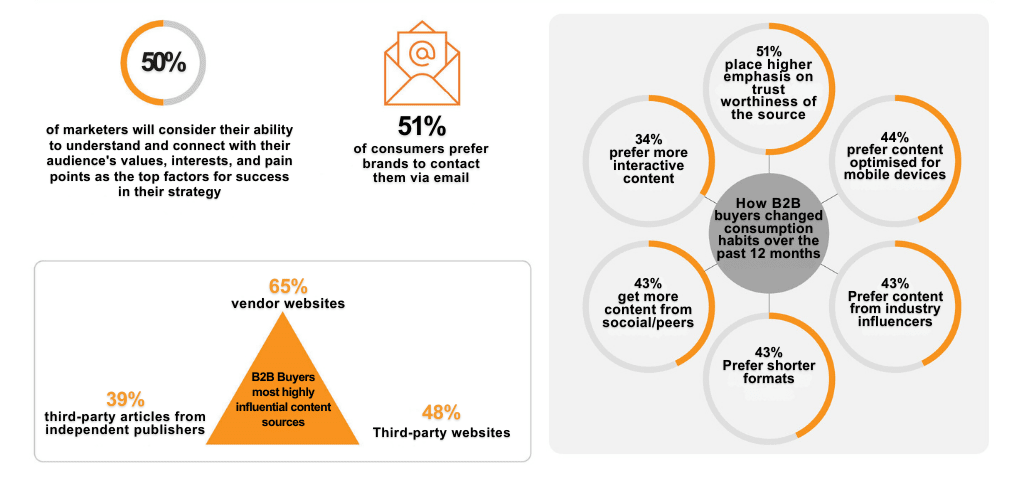
- According to the Content Marketing Institute, in 2020, 50% of marketers will consider their ability to understand and connect with their audience’s values, interests, and pain points as the top factors for success in their strategy.
- A study from MarketingCharts in 2020 revealed that 65% of B2B buyers found vendor websites to be highly influential content sources, with 48% citing third-party websites as most important and 39% finding third-party articles from independent publishers to be influential.
- In 2019, SmarterHQ reported that over half (51%) of consumers prefer brands to contact them via email.
- According to the Demand Gen Report in 2020, when asked about changes in content consumption habits over the past year, 51% of B2B buyers emphasize the importance of source trustworthiness. Additionally, 44% preferred content optimized for mobile devices. 43% preferred content from industry influencers, 43% liked shorter formats, 39% obtained more content from social networks and peers, and 34% preferred interactive content.
Latest Trends in Content Marketing:

Content Marketing is evolving, with trends that emphasize personalization, automation, and diverse content formats.
- In 2020, the global market for artificial intelligence (AI) software was projected to experience a remarkable year-over-year growth of approximately 154%, according to Statista.
- A study by Social Media Today in 2019 revealed that 75% of marketers claimed to utilize at least one form of marketing automation tool.
- In 2020, the Content Marketing Institute and MarketingProfs highlighted that the main focal points for content marketing were anticipated to include the quality of content, the quantity of content produced, and the measurement of performance.
- In a report by Altimeter in 2019, 51% of marketers expressed their agreement that leveraging more data to craft customised content along the customer journey was a key priority for the upcoming 12 months.
- The Content Marketing Institute and MarketingProfs found in 2019 that 54% of B2B marketers employed marketing automation software to support their content marketing efforts, and 75% of them believed that marketing technology offered better insights into content performance.
- According to a study by EmailMonday in 2020, B2B marketers identified several advantages of marketing automation, with 60% citing improved user experience and communication relevance. Additionally, higher conversion rates (59%), better quality leads (57%), and increased lead generation (57%) were recognized as other significant benefits.
What are the latest trends in content marketing?
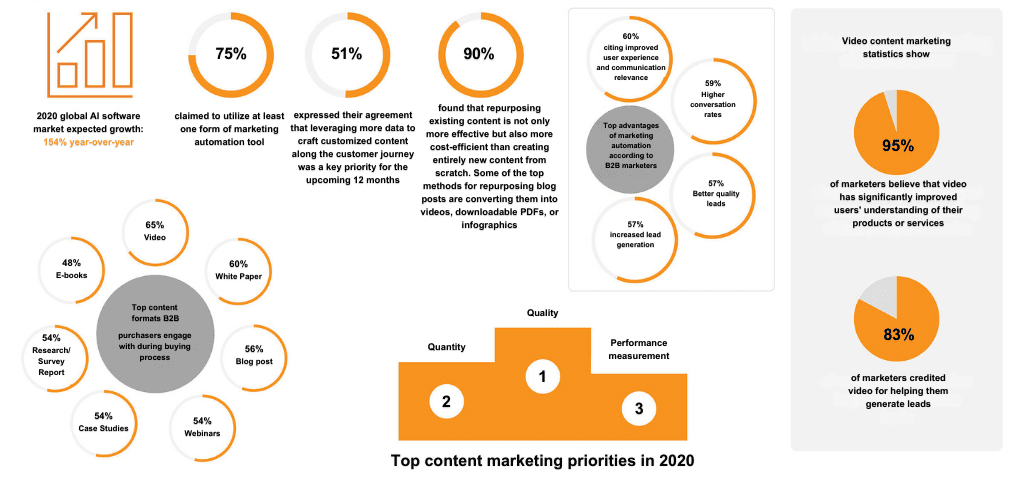
Content statistics also demonstrate a growing expectation among B2B buyers for a variety of content types at every stage of their purchasing journey. In response to this demand, marketers are becoming more adept at optimizing their content by adapting it to different formats.
- The most popular content formats that B2B buyers engage with throughout their buying process include video (65%), white papers (60%), blog posts (56%), webinars (54%), case studies (54%), research/survey reports (54%), and e-books (48) (Source: Demand Gen Report, 2020)
- Almost 90% of marketers have found that repurposing existing content is not only more effective but also more cost-efficient than creating entirely new content from scratch. Some of the top methods for repurposing blog posts are converting them into videos, downloadable PDFs, or infographics (source: Databox, 2019).
- When it comes to video content marketing, statistics reveal that 95% of marketers believe that video has significantly improved users’ understanding of their products or services, and 83% have credited video for helping them generate leads (Source: Wyzowl, 2020).
The Future of Content Marketing:
The future of content marketing revolves around building credibility, delivering valuable customer experiences, and using automation to enhance audience research and content creation. The top-performing B2B content marketers prioritize addressing audience needs over pushing sales messages.
In conclusion, content marketing remains a powerful tool for B2B businesses. By staying attuned to the latest trends and employing data-driven strategies, you can harness the full potential of content marketing to grow your business.
For more insights and statistics on content marketing, reach out to our experts at 1827 Marketing.
[Closing Remarks: Encourage readers to reach out for more information and maybe include a call-to-action such as signing up for a newsletter or requesting a consultation.]
